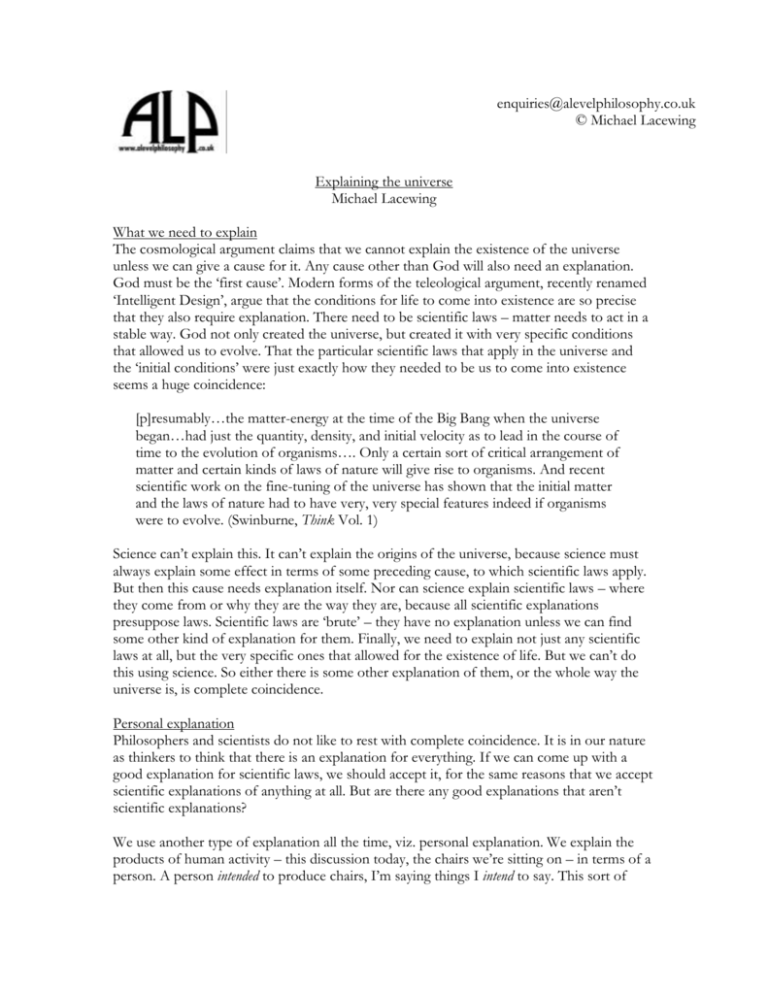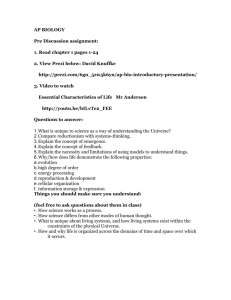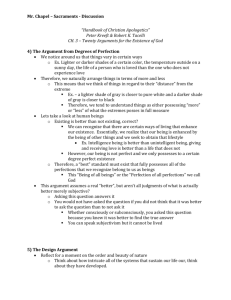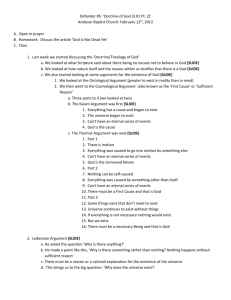The Teleological Argument and the Limits of Explanation
advertisement

enquiries@alevelphilosophy.co.uk © Michael Lacewing Explaining the universe Michael Lacewing What we need to explain The cosmological argument claims that we cannot explain the existence of the universe unless we can give a cause for it. Any cause other than God will also need an explanation. God must be the ‘first cause’. Modern forms of the teleological argument, recently renamed ‘Intelligent Design’, argue that the conditions for life to come into existence are so precise that they also require explanation. There need to be scientific laws – matter needs to act in a stable way. God not only created the universe, but created it with very specific conditions that allowed us to evolve. That the particular scientific laws that apply in the universe and the ‘initial conditions’ were just exactly how they needed to be us to come into existence seems a huge coincidence: [p]resumably…the matter-energy at the time of the Big Bang when the universe began…had just the quantity, density, and initial velocity as to lead in the course of time to the evolution of organisms…. Only a certain sort of critical arrangement of matter and certain kinds of laws of nature will give rise to organisms. And recent scientific work on the fine-tuning of the universe has shown that the initial matter and the laws of nature had to have very, very special features indeed if organisms were to evolve. (Swinburne, Think Vol. 1) Science can’t explain this. It can’t explain the origins of the universe, because science must always explain some effect in terms of some preceding cause, to which scientific laws apply. But then this cause needs explanation itself. Nor can science explain scientific laws – where they come from or why they are the way they are, because all scientific explanations presuppose laws. Scientific laws are ‘brute’ – they have no explanation unless we can find some other kind of explanation for them. Finally, we need to explain not just any scientific laws at all, but the very specific ones that allowed for the existence of life. But we can’t do this using science. So either there is some other explanation of them, or the whole way the universe is, is complete coincidence. Personal explanation Philosophers and scientists do not like to rest with complete coincidence. It is in our nature as thinkers to think that there is an explanation for everything. If we can come up with a good explanation for scientific laws, we should accept it, for the same reasons that we accept scientific explanations of anything at all. But are there any good explanations that aren’t scientific explanations? We use another type of explanation all the time, viz. personal explanation. We explain the products of human activity – this discussion today, the chairs we’re sitting on – in terms of a person. A person intended to produce chairs, I’m saying things I intend to say. This sort of explanation explains an object or an event in terms of a person and their purposes. Could we use this sort of explanation for scientific laws? The claim is simple: the specific scientific laws that allow for evolution are the results of a person who intended to allow for evolution. That person is God. Is this a good explanation? Good explanation Swinburne says it is a good explanation. In science, an explanation is good “when the explanatory hypothesis [in this case, the existence of God and his intention to allow for evolution] is simple and leads us with some probability to expect the data which we would not otherwise expect.” (ibid.) Certainly, if God created the world, including scientific laws, and intended to allow for life to evolve, then we would expect precisely the laws that do, in fact, exist. Instead of being inexplicable, a massive coincidence, they become inevitable. But there are two important challenges to Swinburne’s claim that the explanation is a good one. First, is the explanatory hypothesis – the existence of God – simple? Or is it at least as complex as what it is trying to explain? And what would explain the existence of God? Second, are we actually right to think that scientific laws being as they are really is such a huge coincidence? These two sorts of question can be raised whenever God is used to explain anything, e.g. miracles and religious experience as well as the existence of the universe; and the amount to this: is the existence of God the best explanation? To argue that it is, we need to argue that the existence of God genuinely helps us understand something, rather than making us more puzzled; and that whatever we are trying to explain needs an explanation of this kind (no other explanation will do). Is the explanation simple? Swinburne says the explanation is simple. Simplicity means not invoking more different kinds of thing than you need to; and not giving them more or more complex properties than they need for the explanation to work. Saying that God exists says there is just one being, rather than many; and the properties of that being are simple, viz. unlimited or infinite power, knowledge and goodness. We can question that last property straight away – why does God need to be good in order to create scientific laws that allow for evolution? We have to suppose God intended to create these laws, but we don’t yet have to say why God intended these laws. Goodness doesn’t come into the explanation. But is God simple? Personal explanations explain something in terms of a mind that intended that thing. But the mind is a very complicated thing, much more difficult to explain! One reason for this is that the mind that intends to create something must be able to think of the thing it intends to create – so in a certain sense, it must be as complicated as that thing. A variation on this objection is to ask whether the explanation simplifies our knowledge. It seems that now we have to ask ‘What explains God?’ and this seems to be an even more puzzling question than ‘What explains scientific laws?’. Swinburne says, though, that science is quite happy to introduce an entity – like sub-atomic particles – in order to explain something, even though those entities need explaining themselves, and scientists don’t yet know how to explain them. So we can still say that God is a good explanation for scientific laws even if we can’t explain God. Is this a good move? It looks like we will always have something we can’t explain, so why invoke God? Why not just say we can’t explain scientific laws? Well, if we say this, why should we even explain things in terms of scientific laws – why not say that, e.g. evolution, can’t be explained? There is one difference – scientific laws leave fewer things unexplained, and we should explain as much as we can. In the case of God, is this true? Are ‘more things’ explained if we invoke God? Does the universe need explaining? But do we really need to look for an explanation of the universe? Some things that appear to be coincidence are in fact inevitable. For example, winning the lottery; it is very unlikely that you will win, but it is inevitable that someone will win. So whoever wins, in a sense that they won is a huge coincidence; but we don’t need any special explanation for it (such as ‘someone intended them to win, and rigged the lottery’). Suppose, then, that instead of just this universe, there are or have been millions of universes. Each had different scientific laws, and most didn’t work at all. The laws didn’t allow the universe to continue to exist – as soon as it began, it ended. Others existed, but there was no life. It was inevitable, we might think, that given all the possible variations in scientific laws, one day a universe such as ours would exist, and therefore so would life. It doesn’t need any special explanation – it had to happen. But why ours? Well, it had to be ours because we wouldn’t be here if it wasn’t! Given that life does exist in it, this universe has to have the right scientific laws for life to exist. If it didn’t, life wouldn’t exist in it. There is nothing special about this universe, except that it has the right laws (considered by itself, it didn’t have to have these laws); just like there is nothing special about the ticket that wins the lottery (it didn’t have to win the lottery). But notice that this solution requires us to suppose that there are (or have been) millions of universes. We have no other evidence for their existence, just this argument. Is this really a better explanation than supposing that God exists?








